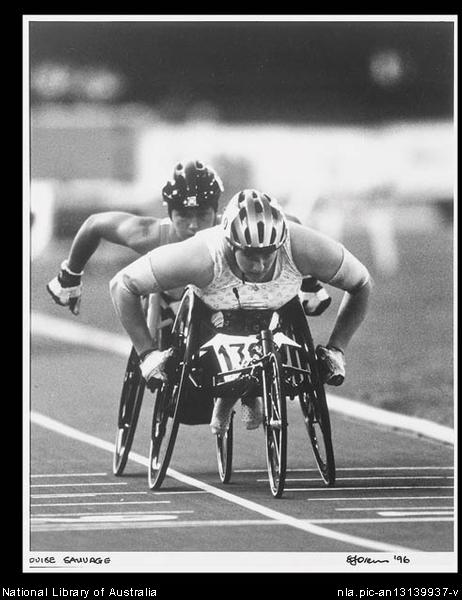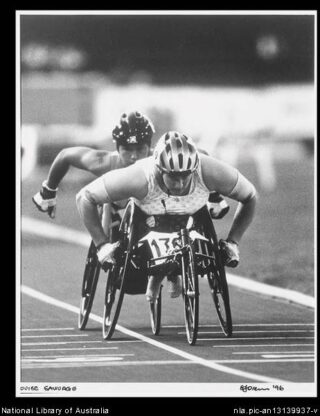- Entry type: Person
- Entry ID: AWE2287
Sauvage, Alix Louise
- OAM
- Preferred name Sauvage, Louise

- Born 18 September 1973, Perth, Western Australia, Australia
- Occupation Paralympian, Wheelchair Track and Road Racer
Summary
Louise Sauvage is a professional athlete and Paralympian who dominated the world of wheelchair track and road racing for well over a decade. Over the course of her career, Sauvage won nine Paralympic gold medals, four Boston Marathons, and was four times the winner of the 800m Wheelchair Exhibition Race at the IAAF World Athletic Championships. She holds world records in the 1500m, 5000m and 4x100m and 4x400m relays. Louise Sauvage was Australian Female Athlete of the Year in 1999, and International Female Wheelchair Athlete of the Year in 1999 and 2000.
Details
The daughter of Maurice Sauvage and Rita (née Rigden), Louise Sauvage was christened Alix after her paternal grandmother, but by family tradition has always been known as Louise. Her father, who came from the French- and Creole-speaking island of the Seychelles off the north-east coast of Africa, met her mother, a ‘£10 pom’ who emigrated from Leicestershire, at a dinner dance in Perth, Western Australia. In 1969 they had a daughter, Ann, and four years later, Louise. The two girls were raised in Joondanna, Perth, where Louise attended Tuart Hill Primary School and later, Hollywood Senior High. She left High School after year ten, completing a TAFE course in office and secretarial studies.
Louise Sauvage was born with the congenital spinal condition myelodysplasia. Her condition necessitated no less than 21 operations before she was ten years old. From the age of three she was swimming to strengthen her upper body and attempting to walk with the aid of splints and callipers. In 1976 she was Perth’s ‘Telethon Child’ as part of a Channel 7 fundraiser for children with disabilities. At the age of eight she began to use a wheelchair, greatly increasing her mobility. She took up wheelchair sports and demonstrated natural ability. As a child, Sauvage later recalled, she had ‘raced, swum, thrown discuses, shot puts and javelins and played basketball in sport for athletes with a disability’. By 1983 Sauvage, labelled ‘The Joondanna Flash’ by the local paper, had been selected to compete in the Second National Junior Games for the Disabled. The following year, aged ten, she became the youngest ever athlete to compete in the National Senior Paraplegic and Quadriplegic Games in Sydney. She came home with two silver and three bronze medals. In 1985 she returned from the National Junior Games in Perth with a haul of fifteen medals, including seven gold. In her early teens Sauvage underwent a number of operations to correct curvature of the spine, virtually living at Princess Margaret Hospital in Perth. Two steel rods placed in her spine spelt the end of a swimming career, leaving Sauvage – though she continued to play basketball – to focus on track racing. It was a fateful move.
Not yet seventeen years old, Sauvage was selected to represent Australia at the 1990 IPC World Championships in Athletics in Holland. There she won gold in the 100m, creating a new world record. She also won the 200m race but was disqualified for moving out of her lane. At the Stoke Mandeville Games in England the same year, Sauvage took gold in the 100m, 200m, 400m, and two relays. Inspired by the then World No. 1 track racer, the Danish Connie Hansen, Sauvage returned from Holland fuelled by a desire to be the best in the world in her chosen sport. Defying those who said a career as a professional athlete was a mistake for a girl with a disability, she trained hard. The lack of elite competition in Australia in her sport meant that she travelled for four to six months of each year in order to put herself up against the best, but the ordeal of flying was not diminished by its frequency. First on the plane and last off, seated up the back with her chairs and luggage, Sauvage was forced to dehydrate her body before each flight to avoid the difficulty of using aeroplane toilets. Like other athletes, she was living out of hotel rooms away from family and friends, training hard and missing out on a normal social life.
Hitherto funded by her family, Sauvage was awarded a Scholarship from the Australian Institute of Sport (AIS) in 1990. She began training six days a week with the AIS and the New South Wales Institute/Sydney Academy of Sport. Her training program included at least twelve sessions a week and a 25km-35km push each morning. At the age of eighteen, Sauvage competed at the 1992 Barcelona Paralympic Games where she won three gold medals and one silver (100m, 200m, 400m, 800m). In 1993 Sauvage was awarded the ABC’s Junior Female Athlete of the Year Award. That same year she competed for the first time in the Boston Marathon, ‘the world’s greatest road race’ for both able-bodied and wheelchair athletes, attracting 100 wheelchair competitors and 40,000 runners each year. Here Sauvage established a strong and lasting rivalry with the American Jean Driscoll, who won eight of the eleven Marathons in which she competed. Not until 1997 did Sauvage out-do her opponent, beating her again in a spectacular photo finish in 1998 and by a chair’s length in 1999. Sauvage won the Marathon for the fourth time in 2001, after Driscoll’s retirement.
After a slightly more relaxed year in Melbourne – where she appeared as herself in an episode of the famous Australian television series, Neighbours – Sauvage began training in earnest for the 1996 Olympic Games and Paralympic Games in Atlanta. She won gold in her only track race at the Olympic Games, beating rivals Driscoll and Cheri Becerra, and went on to win four more gold medals at the Paralympic Games. Having won the 5000m in world record time, Sauvage was competing in the 400m just one hour later, winning gold again with a Paralympic record of 54.96 seconds. She went on to win gold in the 800m and 1500m.
After her success in Atlanta, Sauvage employed a manager, Karen McBrien, and moved to Sydney where she was coached by Andrew Dawes. In late 1998, with the three other members of the Australian Wheelchair Women’s Relay Team, Sauvage took part in the Byron Bay to Bondi fund-raising event for the NSW Wheelchair Sports Association. Together, over 13 days, the girls pushed over 800km. In between her 20-30km stints, Louise had to make a quick visit to Sydney to attend an awards presentation and attend community civic functions and personal sponsor appearances.
The 2000 Sydney Olympic Games were a career highlight. Sauvage carried the Olympic Torch across the Sydney Harbour Bridge, and lit the Cauldron to mark the commencement of the 2000 Paralympic Games. In the 800m demonstration race at the Olympics, Sauvage won gold before a home crowd of 110,000 people. She went on to win two gold medals (1500m and 5000m) and one silver medal (800m) at the Paralympics.
Louise Sauvage was voted Australian Paralympian of the Year in 1994, 1996, 1997 and 1998. She was the Australian Institute of Sport Athlete of the Year in 1997, and in 1998 won the ABIGROUP National Sports Award as part of the Young Australian of the Year Awards. In 1997 the Australian Olympic Committee presented her with the International Olympic Committee Trophy ‘Sport For All’ within Australia, and the following year she was featured in an episode of Australian television’s ‘This is Your Life’. In 2000 she was awarded the trophy for World Sportsperson of the Year with a Disability at the inaugural Laureus Awards hosted by the World Sports Academy.
Louise Sauvage published her autobiography, Louise Sauvage: My Story, in 2002. The book charts the development of a professional athlete whose phenomenal sporting results were once recorded in the ‘human interest’ rather than sport sections of the media. Sauvage hoped (and still hopes) through her wins to raise the profile of disability sports and to raise awareness about athletes – and indeed all members of society – with a disability. She speaks to schools, community groups, and corporations. Sauvage was selected by the Sydney Paralympic Organising Committee as a Media Ambassador to promote the Games throughout Australia, and in 2000 she established the Louise Sauvage ‘Aspire to be a Champion Foundation’, administered by the NSW Wheelchair Sports Association. As part of its Sporting Grants program, the Foundation recently awarded a grant to Brett Ogden, a quadriplegic wheelchair track and road racer. In 2005 Louise Sauvage was inducted into the NSW Sports Hall of Champions.
Events
-
2001
Inducted into the Victorian Honour Roll of Women
Digital resources
Published resources
- Book
-
Article
- Out there with Madonna, Verghis, Sharon, 2002, http://www.smh.com.au/articles
- Journal Article
-
Site Exhibition
- She's Game: Women Making Australian Sporting History, Australian Women's Archives Project, 2007, http://www.womenaustralia.info/exhib/sg/sport-home.html
- The Encyclopedia of Women and Leadership in Twentieth-Century Australia, Smart, Judith and Swain, Shurlee (eds.), 2014, http://www.womenaustralia.info/leaders
-
Resource
- Trove: Sauvage, Louise (19730918-), http://nla.gov.au/nla.party-715054
